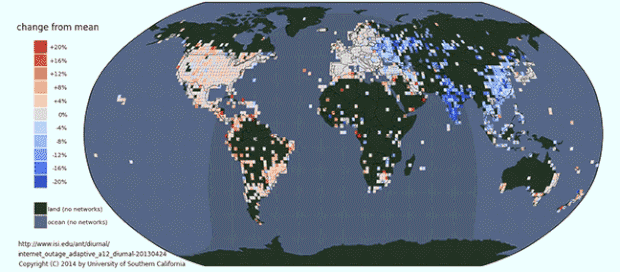This is what it looks like when the Internet sleeps
Here in the U.S., the Internet is something we take for granted 24/7. Any time, night or day, you can log on to check your email, watch a video of adorable animals or simply browse to your heart's content. But researchers at the University of Southern California have found that in other parts of the world, the Internet has a bedtime.
To find out when the web was up and when it was asleep, John Heidemann, research professor at the USC Viterbi School of Engineering's Information Sciences Institute, and his team "pinged" 3.7 million blocks of IP addresses -- representing about 950 million individual addresses -- every 11 minutes for 35 days and recorded when they got a response, an indication of connectivity.
The results showed that while in the United States and Western Europe, where we're always connected, the Internet was active day and night. In Eastern Europe, China, India and South America, however, Internet use was -- like humans -- diurnal, or daytime-oriented. There were more active addresses during the day and fewer in the middle of the night and wee hours of the morning.
"It is well established that network traffic changes diurnally, as a result of human use of the network, from web browsing and video to e-mail," Heidemann said. "We believe our work goes a step further to show that the number of computers on the network changes over the course of a day. We believe these changes correspond to people suspending laptops and shutting off desktops, and to computer labs and Internet cafés shutting down at night."
Several factors contribute to whether or not the Internet naps. More sophisticated networks, like cable modems and fiber-optic networks such as Verizon FiOS and Google Fiber, are designed to never be turned off, while dial-up is designed to be used occasionally, when you're not on the phone. In countries with poor infrastructure, Internet service will be disrupted when the electricity goes out.
Policies come into play, too: Some countries, like the U.S., make broadband access a priority, while others discourage always-on Internet, the researchers said. And governments may go so far as to shut off the Internet, as has been done in Syria, Egypt and Sudan during the conflicts in recent years.
The patterns correlate with economic activity, too. The data showed that countries with a strong sleep-wake cycle tend to have lower GDPs, while richer countries are constantly connected.
The researchers said that "fast, broadband networks are seen as economic enablers," that allow business and commerce to continue at all hours of the day, and that "and fast, always-on networks are changing life in Korea, Japan, China, and Europe."
The study results can also help track and respond to network outages, such as the ones experienced in the Northeast after Hurricane Sandy.
"This data helps us establish a baseline for the Internet -- to understand how it functions, so that we have a better idea of how resilient it is as a whole, and can spot problems quicker," Heidemann said.
